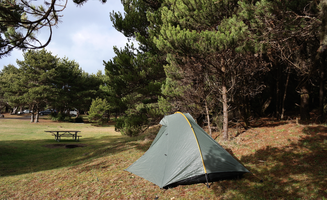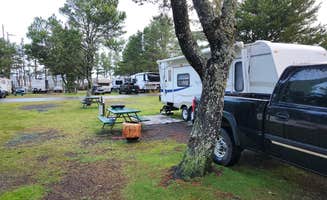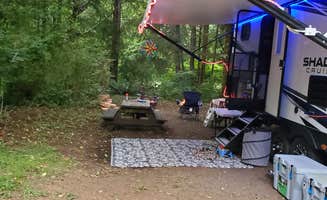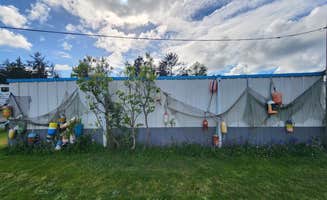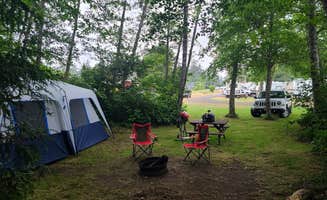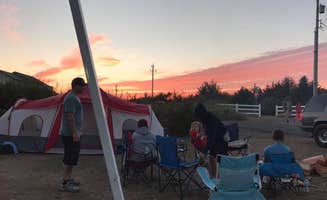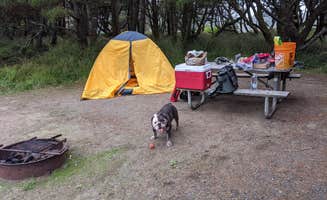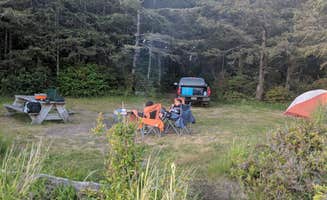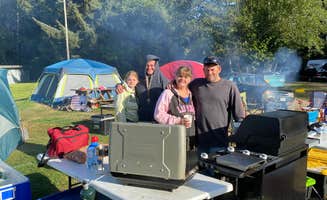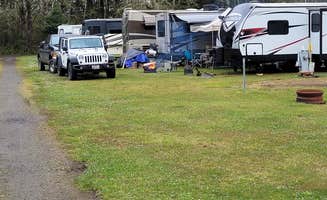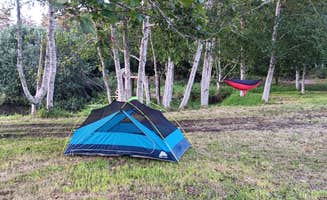Ocean Shores camping options extend beyond the immediate shoreline, with sites located throughout Grays Harbor County in Washington. Most camping spots near Ocean Shores, Washington sit below 50 feet elevation, positioned between coastal dunes and inland forests. Sites frequently experience morning fog that burns off by midday, even during summer months, creating distinct camping microclimates throughout the day.
What to do
Explore tidal zones: Access beaches directly from Twin Harbors State Park Campground, where multiple walking paths lead through coastal vegetation. "The beach was awesome. Just a short drive to Grayland where we set off fireworks for the 4th of July," notes one camper who enjoyed the immediate beach access.
Blackberry picking: Summer visitors can harvest wild blackberries around camping areas. At Ocean Breeze RV Resort, one camper reports, "We found tons of wild blackberry bushes near our site," making for fresh snacks during summer stays when berries ripen.
Beachcombing: The expansive beaches provide excellent opportunities for collecting shells and sand dollars. A visitor to Grayland Beach noted, "Lots of sand dollars," highlighting the abundance of beach treasures along this stretch of coastline. Early morning hours before other beachgoers arrive offer the best collecting.
Walking trails: Most coastal campgrounds maintain nature paths through dunes and forested areas. A visitor to Copalis Beach RV Resort mentioned, "Our dog had a great time running on the beach and walking the trails in the dunes," pointing to the well-maintained trail systems available for exploration.
What campers like
Private tent sites: While RV areas tend to be more open, tent campers find secluded options in several campgrounds. "The tent sites were a little more wooded and secluded," reported a visitor to Ocean City State Park Campground, noting the contrast between camping accommodation types.
Ocean sounds: Falling asleep to breaking waves ranks among top experiences mentioned by campers. One visitor to Pacific Beach State Park Campground shared, "What mattered was that we could hear the ocean as it was a couple minutes walk from the beach," emphasizing the sensory camping experience.
Wildlife viewing: Deer regularly visit many campgrounds in the area. A reviewer at Ocean City State Park observed, "Deer wander through unattended sites," creating unexpected wildlife encounters even at more developed campgrounds.
Shade options: Heavily forested sites offer relief from direct sun. A camper at Ocean Breeze RV Resort noted, "There are sites in open areas, some cut into the forest, and some completely covered by trees," highlighting the diverse site options available to match camper preferences.
What you should know
Limited privacy: Many campgrounds feature tightly arranged sites, particularly in RV sections. A camper at Grayland Beach State Park Campground observed, "Most sites are semi-private with acceptable separation," indicating the relative closeness of campsites throughout the region.
Weather variability: Coastal conditions change rapidly regardless of season. A reviewer at Ocean City State Park shared, "A few were flooded last weekend but we still managed a fire in the provide ring between storms," demonstrating the need for weather preparedness even during summer months.
Reservation requirements: During peak season (June-August), sites fill months in advance. Pacific Beach State Park receives particularly high demand, with one visitor noting, "Summer books up quickly, need to secure 9 months in advance," highlighting the competitive reservation timeline.
Fee structures: Most developed campgrounds charge $25-45 per night with additional fees for premium sites. Sites with utilities cost more than standard tent sites. Some campgrounds offer monthly rates for longer stays.
Tips for camping with families
Playground access: Several campgrounds maintain children's play areas. A visitor to Ocean Breeze RV Resort - KM Resorts mentioned, "Several playgrounds, a large pool, and other facilities that were all open," making it suitable for families seeking recreational amenities.
Site selection: Families should consider proximity to bathrooms and noise levels. One camper at Twin Harbors noted, "Site 299 was also one of the biggest, and close to the restroom," pointing out key factors for family comfort during stays.
Insect preparation: Mosquitoes remain active throughout camping season in coastal areas. A camper at Twin Harbors reported, "The mosquitos were pretty bad, and werent deterred by our 'froo froo' spray, so do yourself a favor and take deet," emphasizing the need for effective insect repellent.
Campground events: Some parks offer organized activities during summer months. Ocean Breeze RV Resort schedules regular weekend breakfasts, with one visitor noting, "Love the Saturday Morning pancake breakfast and the Sunday morning cinnamon rolls," highlighting social opportunities for families.
Tips from RVers
Hookup locations: Some campgrounds have inconveniently positioned utility connections. A Twin Harbors camper warned, "We had to run to town because the water and power hookups are ridiculously far away from where they sit on anyone's trailer or RV," suggesting the need for extension cords and longer hoses.
Site selection strategy: RVers recommend driving through campgrounds before selecting a site when possible. At Hoquiam River RV Park, a visitor observed, "Bathrooms are clean. Laundry facility works really well. And the little walking trails along the river were gorgeous," emphasizing the importance of selecting sites near preferred amenities.
Dump station access: Not all campgrounds offer sewer hookups at individual sites. A reviewer at Ocean Breeze noted, "No sewer hookups! In a 300+ site campground I was shocked to learn they had no option for sewer. They have 6 dump stations in 2 locations instead," highlighting infrastructure limitations RVers should anticipate.
Wi-Fi connectivity: Internet access varies significantly between campgrounds. A Copalis Beach RV Resort camper reported, "Wi-fi is available for a fee, otherwise not accessible," indicating the need for alternate connectivity solutions when staying in coastal campgrounds.


